Hi, I would like to share my journey on learning scuba diving, getting myself familiar from fear of this and able to appreciate world underneath blue sea.
Starting point of diving
Ok, Let’s skip back to a month before (August 2024). I went to company outing trip at Koh Change, Trat. Reflecting many things both works, life and “other stuffs” and did couple of activities with colleagues e.g. driving ATV up to mountains and “snorkeling”.
I have to highlight “snorkeling” since it’s one thing trigger my interest on going furthur than just looking at stuff on sea surface, even though I have a bit fear in going down. Oh, and another one right. To be honest, that’s is not a good starting ingredient and this is the context.
Bier: ใจพี่เจ็บหว่ะ
E████: ให้โลกสีครามโอบกอดพี่มั้ย 5555
5 AUG 2024
20 seconds later I decide to learn scuba diving after tons of people failed to convince me for a year (I focused on bouldering really lot last year). By the way, the guy who I had chat (Earth) is an experienced diver learning on stepping as divemaster at scuba paradive. We chatted a lots on course, settle the schedule and my journey of learning first course on scuba diving begun.
Theory learning
I had a theory class online alongside others at night before learning in pool. The session covered from environment of the underwater sea (pressure, vision and sound), buoyancy, how water pressure affects our body, equipments for scuba diving and procedures for diving both normal situation and emergency.
Skill training at the pool
At next day, I and Earth went to a swimming at Nonthaburi to begin learning in practice. Started from equipments and how to assemble gears before diving (and vice verca). Practiced giant stride to go into water with scuba tank. Learned hand signals to communicate underwater.
There are many skills that diver should be able to do in order to dive safely e.g.
- regulator recovery and clearing (get air regulator back to mouth and purge to clear water)
- mask flood (remove leaked water from mask) and mask remove and replace
- sharing alternate air source (and vice verca)
- fin pivot
- CESA (controlled emergency swimming ascent)
Just check out this video if you want to see it in action.
Aside from those skill, swimming around deeper level (2 meters) and practicing things e.g. ear equalization when diving deeper, breathing through regulator.
Now, it’s for real one at sea. Samesan, Chonburi. I chose that place to do exam since it’s near, even though the surrounding in underwater is dusty.
Day 1
1st dive, which shouldn’t called 1st dive for me.
For first dive, Earth (as teacher assistant) and others get down to setup anchor for diving. Everyone needed to follow the rope to the ground before doing skill check.
For me, I tried diving down, equalizing ear, but went a bit too fast that I panicked since it’s too fast. Accidently, get my regulator off and water shrugged at me, and with me keeped kicking my feet made me went up to surface. That’s not good way to start (Quickly ascent with air in lung can make lung damaged and occured DCS).
I tried for second time and it’s a bit the same but more slower so teacher decided to abort my dive, recheck my condition if I’m not hurted.
I thinked at that time I tried to do things too quickly but forgot that I need to concentrate on my breath first. It like meditating but it’s in underwater.
1st dive second time
Before diving, my teacher told me to practice breathing using regulator while assistants setting up buoy, everyone going down and he’ll come back to get me down. But the sand is too soft that anchor is not stable it’s aborted.
Captain decided to move diving spot to a small rocky island and using anchor rope of the boat to descent since it’s stronger than small buoy rope. For me, I did the same as before, breath and breath, getting myself more familiar before descent.
I started descent down holding rope with teacher watching. I went more slowly this time. Breath, equalize ear, clear mask, pull rope down. Slowly, surely. until I setted my feet to the ground without fear of stepping sea urchins (or something worse). The teacher shook hand to me as if an astronaut arrived the new planet (I even hugged, lol).
I have to say the visiblity there is bad that it’s a bit hard to follow that I took teacher’s hand and followed along while clearing mask. A bit anxious but saw a turtle during that dive can help my mind a bit. We went ascend really slowly since the landscape is a bit slope and we swam a bit shallower from 7-8 meters and there is not much depth left before doing ascending.
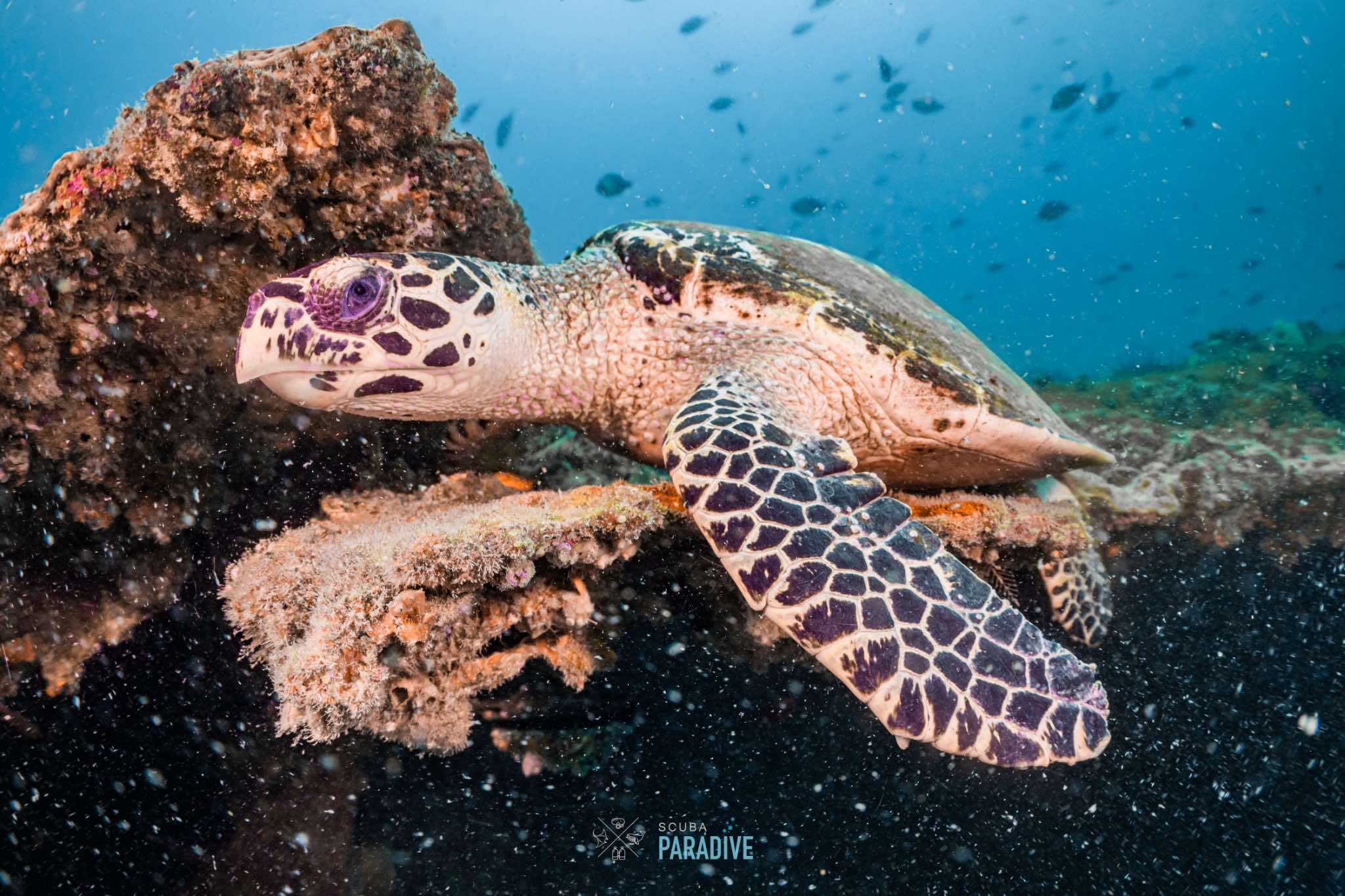
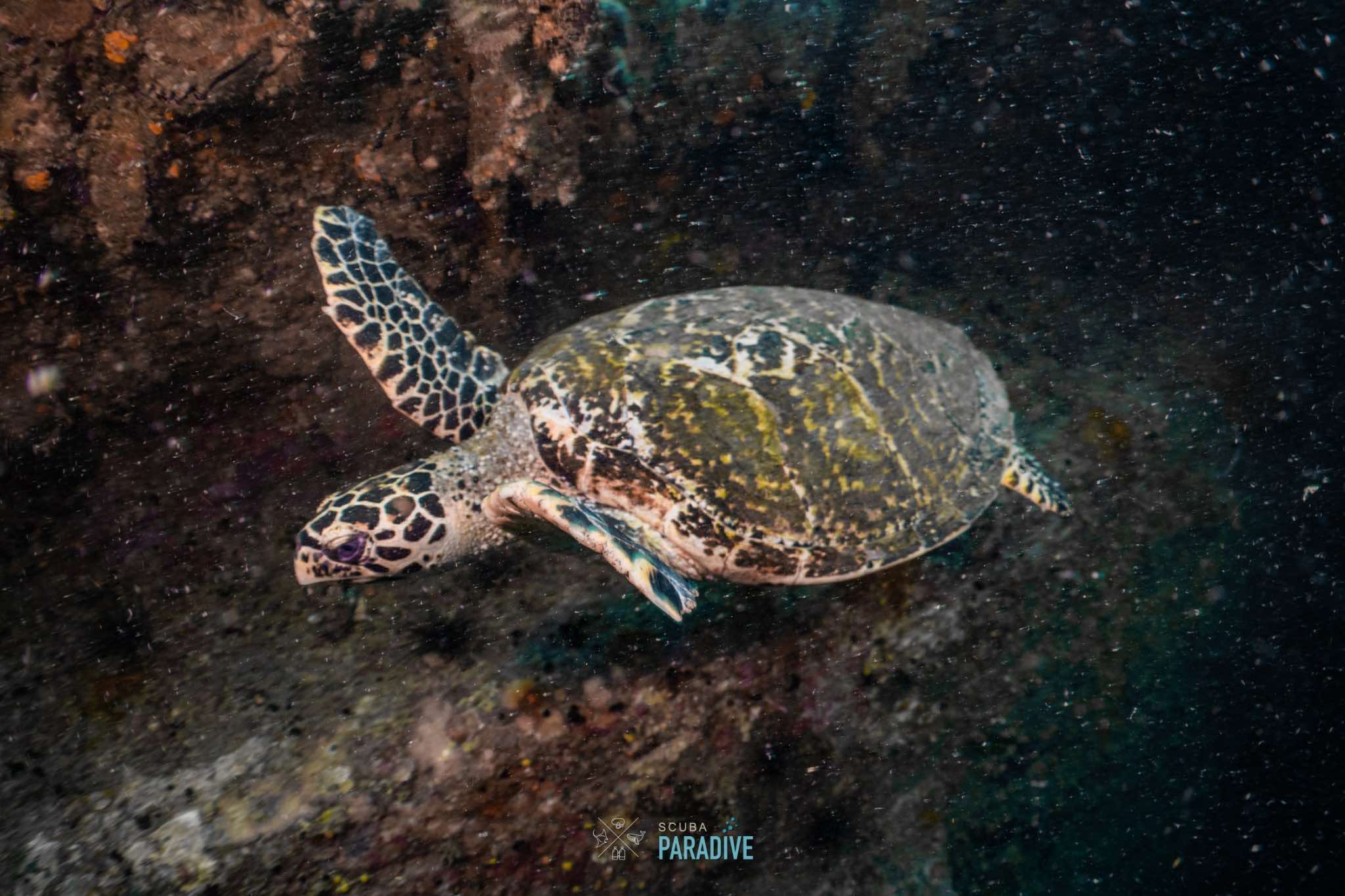
For comment: You’re good at control your buoyancy, just don’t be too anxious so you can appreciate the nature of deep blue sea more.
Day 2
For brief in day 2 is a bit packed since I need to complete 4 dives with skills checked to pass the exam. But I was more relaxed from first day so let’s get to it.
3rd dive, start to do skill check
This dive is similiar to 2nd dive, using anchor rope from boat to descent, swam around for while before skill check. A bit difference is it’s more deeper this time (around 7-8 metres)
The skill checks are regulator recovery and clearing (what I did wrong at first dive), partial and full mask clearing and fin pivot. Everything is done nicely, for some of them I redid since I’m not sure but teacher said later that it was okay. After all stuff there, we did safety stop using teacher’s dive comm to countdown before ascend and learned doing bubble trick (which I failed, lol).
After got back a while, with a very stable current. We decide to do an extra dive there quickly for more skill check. This time I equipped a compass and dive comms.
4th dive, learn basic navigation and dive comms
Dive comm is a crucial device for diver to check the current state of diving including: depth, time usage, nitrogen loads, cooldown time for decompression after dive and “safety stop” countdown before ascend back to water surface.
This dive also has the same pattern of previous one but more quickly. For skill checks I did navigating using compass (going back and forth with correct direction), mask remove and replace (forgot from previous dive) and sharing alternate air source.
Everything went well in this dive.
5th dive, the most contentful dive
We moved the diving spot to the island the same to 2nd dive but the weather is a bit worse, it’s raining at the area furthur away, the current above is a bit more aggressive and using boat anchor rope is not an option.
Teacher told me that we need to dive directly this time. After some warmup (using regulator at the surface, the same method I found from 2nd dive and I start to get this as habit), I descent with teacher as buddy. Seeing depth in dive going down more and more (around 14 metres). Everything is okay, no more my panicked self.
I swam alongside with teacher while watched him showing fancy moves e.g. picking sea urchins. I was a bit floated from ground compared to teacher but it has more visibility when hovering from above. I saw blue-spotting stingray, couple of fish and a diver who measured coral line and noted data to the board.
I finally regrouped with the main group. With P’Ken (one of the assistant) which took the camera, we took both group and single photo as memories of first dive trip. I did the last skill check with teacher, the CESA which used as emergency method for ascending.
And that’s the last dive, both for exam and trip.
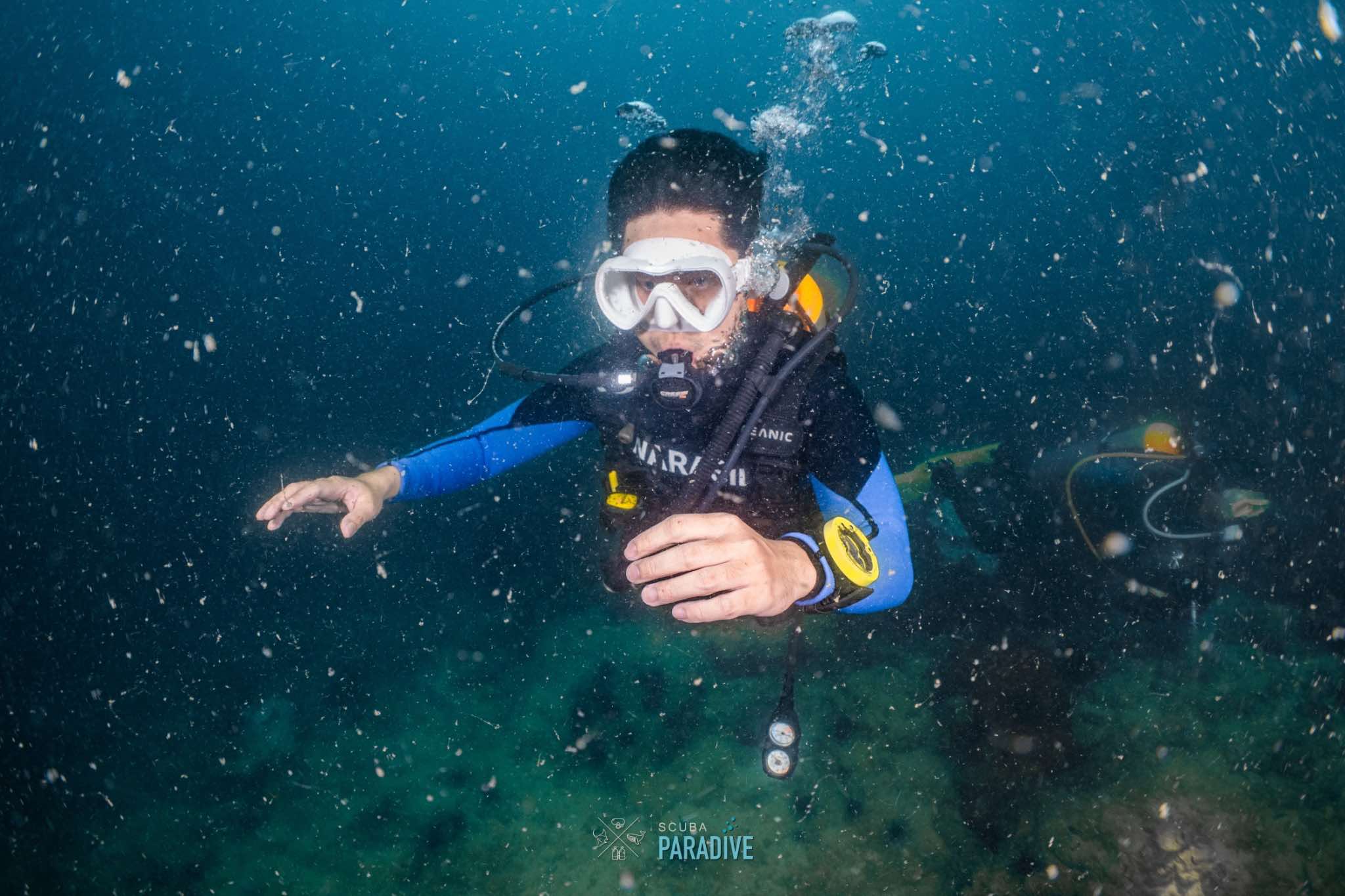
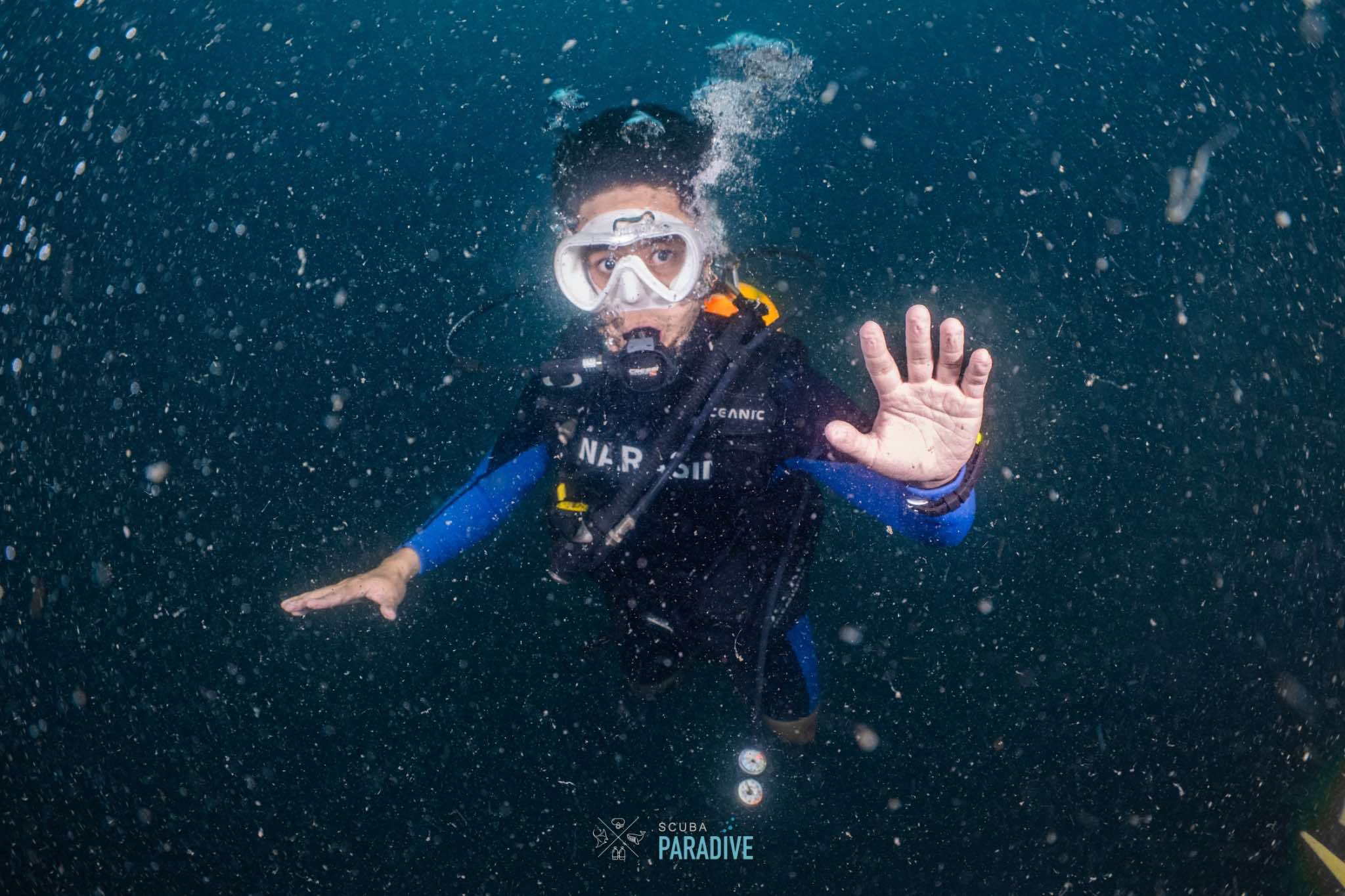
What I’ve learned, perspective of diving for me right now and what’s next?
Aside from knowledge in diving, I learned to bring the focus back (usually when there’s something start to be tricky) and control myself. I also glad that there’s another thing I can do.
I would like to thank to P’X and P’Pee (teachers), N’Earth (divemaster and a successful upline who convinced me), P’Jan and P’Ken (divemasters) and others who joined this trip, encouraged me to push myself against my fear and limits.
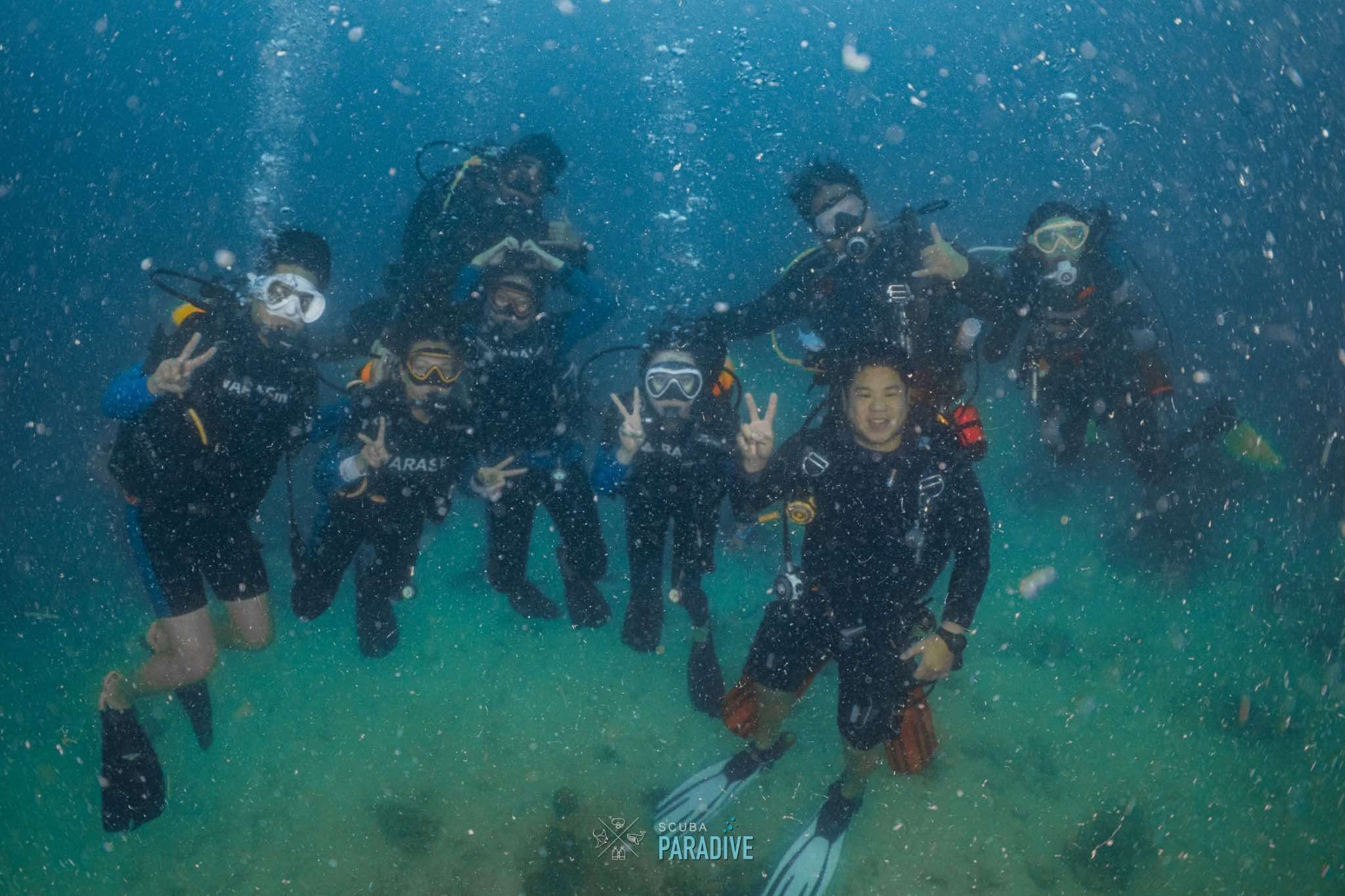
…
I haven’t told about what’s next right?
Cut out financial perspective from this problem. I think it’s something worthy to give it a shot and I definitely do more. I have a really crude plan on doing some fun dives (open water at most 18 metres) before moving to advanced open water course.